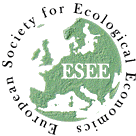 |
10th biennal conference of the European Society for Ecological Economics.
18-21 Jun 2013 Lille (France)
|
ESEE 2013 Policy Event (Brussels)Ecological Economics and the EU-level policy making: where do we stand in terms of interaction? A Policy - Science event Brussels Tuesday, June 18, 2013 9:30 am to 3:00 pm (timing remains indicative) contact : tbauler@ulb.ac.be *** Rationale In line with the focus given to ESEE 2013 on the institutional dynamics, a pre-ESEE 2013 conference Policy Event will take place in Brussels focusing on the evolution of the modes, forms and depths of the institutionalisation of the (main) research foci of Ecological Economics. The opportunity will be grasped to explore the linkages of Ecological Economics to the EU-level policy making. We will explore opportunities to organize the policy event in direct collaboration with the EU-institutions (e.g. EU Parliament and/or DG ENV&DG RTD), notably by asking them to host the event in their premises. The Policy Event will strive towards rendering a more inclusive comprehension of how Ecological Economics’ core messages, paradigms and methodological stances find an echo in policy agendas, policy discourses, policy instruments at EU-level. In simplified words, how and to what degree Ecological Economics is institutionalized at the EU-level? We are aware that the question is exploratory, hence the format of the event will be facilitating co-exploration: the event will be structuring debates via moderated round-tables and Q&A from the audience. Exploring this question asks to organize the debates and discussions around what Ecological Economics “is” and what it “represents” potentially for policy; arguably a difficult question. We chose to distinguish 3 layers of reading of Ecological Economics: as a society and institution on its own that runs journals-conferences-meetings, as a series of research results explored in particular RTD projects, as a series of tools and concepts manipulated by Ecological Economists. The policy event will hence be organised around 3 thematic round-tables; a “projects”-roundtable, a “tools and concepts”-roundtable and a “ESEE/ISEE societies”-roundtable. Each roundtable will host a series of members of the wider Ecological Economics’ community of scholars and will invite EU-level policy-makers/actors to act as discussants. A detailed preliminary program is given below. Among the questions which should structure the event’s debates are: Has heterodoxy in (economic) thinking about Nature-Society relationships been institutionalized, as a valid alternative to orthodoxy? Where are the most important interactions (and of what kind?) created today between EcolEcon and the EU-policy configuration and the EU-policy thinking in environmental decision-making? Are these interactions created along EcolEcon principles and concepts (e.g. such as incommensurability), or along people and scholars, or along research groups and their tools, or along policy problems (e.g. such as rebound effects or Ecosystem services’ evaluations), or along policy&science processes ? What is the role and influence of RTD projects and more targeted policy studies ? What influence do the EcolEcon-societies play in the interface with policy-making (e.g. with regard to configuring Horizon2020)? What is the policy-role of the EcolEcon journals, and in a wider perspective the reports, publications and books ? Is there a particular representation and perception of EcolEcon in the EU-institutions w/r to EcolEcon-people, -ideas, -principles, -tools? Organisation The targeted participants to the policy event will be participants to the ESEE2013 conference, in particular those working on applied, policy-related research agenda and research projects for/at the EU-level, and participants interested in the institutionalisation of Ecological Economics. The event will be announced in parallel also to policy actors in the EU-sphere in Brussels (ranging from the Institutions per se, NGOs, think tanks…) and might thus attract an additional set of non-ESEE2013 participants. We target (a maximum of) 80 participants in order to keep the organisation feasible and in order to allow some form of dialogue to emerge between the participants of the round-tables and the audience. Financially, the event will be supported by a participant’s fee (30 EUR) (for ESEE2013 participants additional to the main conference’s fee). Exact timing of the event will be scheduled in order to allow ESEE2013 participants to join the opening event of the ESEE2013 conference in Lille on time. Trains depart from Brussels’ Midi Station at 3: 56 pm (best option) or 4: 56 pm (alternative) and arrive at Lille-Europe Station 34 minutes later. These are EUROSTAR-trains, which means check-in is required 30 minutes before departure time. Transport costs will not be covered with the participants’ fee. Preliminary program The round tables on “projects” and “concepts and tools” will be each seeing a limited (3) set of synthetic presentations (of the projects, tools&concepts) by their main EcolEcon scholars. The content of these presentations will be a short description of the content of the project (or concept&tool), but will focus around the interactions the project (or concepts&tools) wanted and did create with policy actors and policy design at large. Each presentation will be followed by an intervention by a designated discussant from within the EU-level Institutions. The third round-table on the role of ESEE/ISEE will be introduced by a short address and will proceed with a moderated discussion with representatives of the societies and the audience. More info and detailed program: http://igeat.ulb.ac.be/fr/presentation/esee2013-brussels |
| Online user: 1 | RSS Feed |

|
